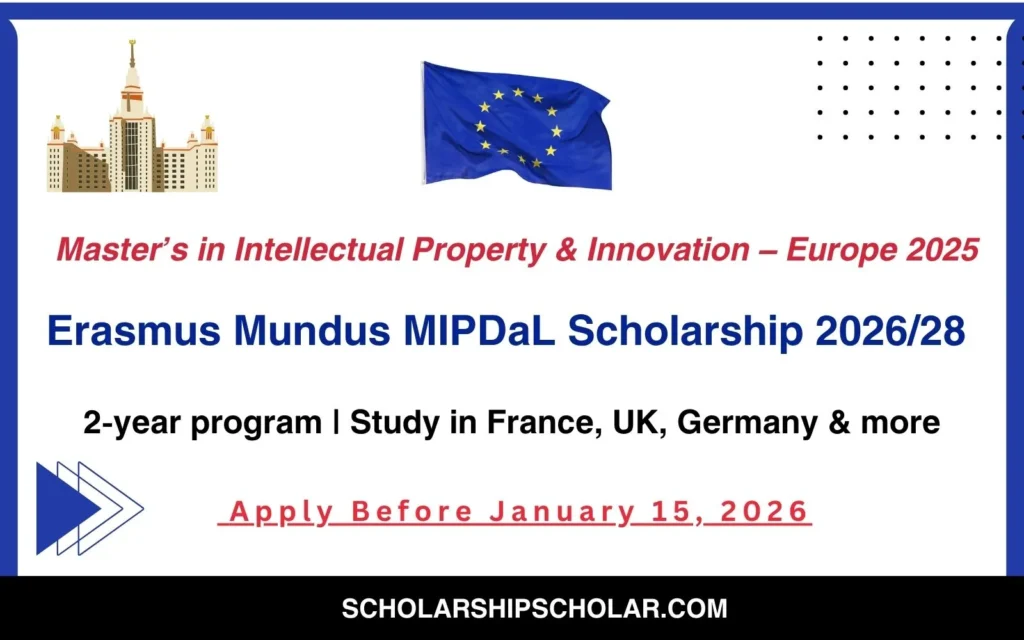In today’s fast-evolving digital world, law and technology are increasingly intertwined. The importance of intellectual property protection, data privacy, and digital innovation is increasing in today’s life. So the professionals who understand both the legal and technological sides of these fields are in high demand.
If you’re someone who wants to build a global career in intellectual property law, data protection, or technology governance, the Erasmus Mundus MIPDaL Scholarship 2026/28 is a golden opportunity. The European Union funds this scholarship. This prestigious program offers a fully funded two-year Master’s degree that allows international students to study at multiple top-ranked European universities.
The Master of Intellectual Property Law and Data Law (MIPDaL) program stands out for its interdisciplinary approach, combining legal studies, technology, and innovation. It not only provides world-class academic training but also equips students with the professional and analytical skills required in the modern legal landscape.
Each year, only around 12 students from across the world are selected for this highly competitive program.
Interested candidates can apply for the Erasmus Mundus MIPDaL scholarship before the deadline January 15, 2026.
In this article, we have explored all the important points of this scholarship. So read the article fully.

About the Erasmus Mundus MIPDaL Program
The Master of Intellectual Property Law and Data Law (MIPDaL) is part of the prestigious Erasmus Mundus Joint Master’s Degree (EMJMD) initiative, co-funded by the European Union. This program aims to provide advanced academic training in key areas of intellectual property, data law, and creative industries.
Graduates of this program are well-prepared for careers in international law firms, research institutions, tech companies, and global organizations.
Key Details
| Host Countries | Germany, France, United Kingdom, Estonia, Spain |
| Program Name | Master of Intellectual Property Law and Data Law (MIPDaL) |
| Program Duration | 2 Years |
| Funding Type | Fully Funded |
| Application Deadline | January 15, 2026 |
| Tracks Available | IT & Data Law, Creative Industries, Industrial Property Law |
| Application Fee | None |
Financial Coverage
The Erasmus Mundus MIPDaL Scholarship offers comprehensive financial support to ensure that selected students can focus entirely on their academic and professional development.
The scholarship covers:
- Full tuition fees for the entire duration of the program
- Monthly stipend of €1,400 to cover travel, visa, installation, and living costs
- Support for study materials and administrative expenses
With all these benefits, students can enjoy a completely cost-free academic journey in Europe.
ALSO READ: NOHA Erasmus Mundus Scholarship 2026-28
Partner Universities
The MIPDaL program is delivered by a consortium of six prestigious European universities, each bringing unique expertise in law, technology, and innovation:
- Université de Strasbourg (France) – Centre d’études internationales de la propriété intellectuelle (CEIPI)
- Tallinn University of Technology (Estonia) – Department of Law
- Queen Mary University of London (United Kingdom) – Centre for Commercial Law Studies
- Dresden University of Technology (Germany) – Institute of International Law, Intellectual Property Law and Technology Law (IRGET)
- Universidad Carlos III de Madrid (Spain) – Faculty of Civil Law, Private Law Department
- University of Exeter (United Kingdom) – School of Law
Program Structure
First Semester
Students begin their studies at one of the following partner universities:
- Technische Universität Dresden (Germany)
- Universidad Carlos III de Madrid (Spain)
- Tallinn University of Technology (Estonia)
- Université de Strasbourg / CEIPI (France)
Second Semester and Specialization Tracks
After completing foundational coursework, students select one of the three specialization tracks and move to the corresponding university.
| Specialization Track | Universities |
|---|---|
| IT & Data Law | University of Exeter (UK), TU Dresden (Germany) |
| Creative Industries | Queen Mary University of London (UK), TU Dresden (Germany) |
| Industrial Property Law | Université de Strasbourg (France), University of Exeter (UK) |
Eligibility Criteria
To be eligible for the Erasmus Mundus MIPDaL Scholarship 2026/28, applicants must meet the following requirements:
- Nationality: Open to applicants from all countries
- Mobility Rule: The two universities you study at must be located in countries different from your country of residence
- Academic Qualification:
- A four-year degree (Bachelor’s + first Master’s or a single four-year Bachelor’s degree)
- Students who have completed at least 80% of their credits may apply for a conditional offer
- Language Proficiency:
- Applicants must demonstrate proficiency in English, French, or Spanish
- Official language test results are required
Required Application Documents
Applicants should prepare the following documents for submission:
- Statement of Purpose (Motivation Letter)
- Proof of language proficiency (English/French/Spanish)
- Copy of valid ID or passport
- Academic reference letter
- Updated Curriculum Vitae (CV)
- Academic transcripts and degree certificates
Application Process
The application process is entirely online, with no application fee required. Candidates must apply through the official MIPDaL Erasmus website before the deadline.
Steps to Apply:
- Visit the official MIPDaL application portal.
- Create your profile and complete the online form.
- Upload all required documents.
- Submit before January 15, 2026.
Frequently Asked Questions (FAQ)
1. Who can apply for this scholarship?
Applicants from all countries are eligible. However, their chosen study destinations must differ from their country of residence.
2. Is there an application fee?
No, there is no application fee.
3. How long is the program?
The program duration is two years, with study periods in two different European universities.
4. Which languages are accepted for instruction?
Courses are taught in English, French, and Spanish, depending on the chosen track and university.
5. How many students are selected each year?
Approximately 12 students from around the world are selected annually.

